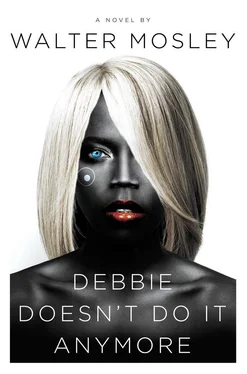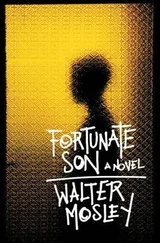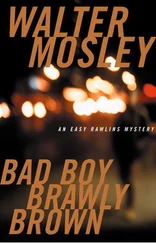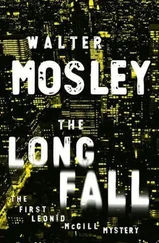“Nuthin’.”
“I only ask,” Jude said, “because I gave a bag just like that to Deb only an hour ago. We’re very good friends, you know. Very close.”
Coco gave me an evil stare.
“I don’t appreciate people fucking with my friends,” Jude added. “I don’t like it when they try to extort them either.”
“I bought her debt.”
“You bought Theon Pinkney’s debt. Deb never borrowed a cent, did she?”
“Listen, man—”
“I asked you a question in my house,” Jude said, cutting the gangster off.
Again Coco was silent.
“You know me, Coco,” Jude said in a soothing tone. “I’m a fair guy. I don’t push people around. I mind my own business. But Theon was my friend and Deb here is too. You have no reason to make her pay for an act of God; neither does Dick Ness.”
“So what you sayin’, Jude?”
“Mr. Lyon.”
“What do you want?”
“Give Deb her money back and tell Dick from me that he should repay you. If he doesn’t like that he knows where to find me. If he needs a friend in some of his work he can call me then too. How’s that?”
“I’ve wasted time on this.”
“Time lived is an eternal blessing,” Jude Lyon quoted from somewhere.
Coco’s nostrils flared. He pushed the leather bag six inches across the table in my direction. Then he stood up, refusing to look at me. I knew by this avoidance that I was safe.
As Coco walked out of the restaurant I said, “Thanks, Jude. Thanks a lot.”
“Theon knew that he could pay off Ness but he died before we saw each other. And Dick and Coco know there’s no insurance in the loan-sharking business. Call me if you need anything else.”
Jude left soon after Coco. I stayed because I didn’t trust my legs to carry me or my hands to steer a three-ton automobile.
I ordered pounded pork chops with brussels sprouts and new potatoes and waited for the food to come. My mother was crying somewhere in a room far away and long ago. She was crying, night after night, because my father was out with his thug friends getting into trouble, breaking the law.
When he’d come home my mother stayed in the bedroom while Aldo poured himself a drink in the dining room.
On one such evening, when I was ten, I climbed out of bed and went to see my father while his wife dried her tears and waited.
“Hey, baby girl,” he said when I walked in. He was drinking scotch and smoking a filterless cigarette.
“Daddy?”
He held out his arms and I ran to sit in his lap.
“Yeah, babe?”
“How come you stay out late with them men an’ make Mama cry?”
It was a dangerous question. Aldo Peel had a bad temper and when he was mad anything could happen. I knew I was risking something terrible, but still I needed to know why my mother had to suffer.
Instead of shouting and throwing me to the floor my father laughed. He kissed my cheek and hugged me tightly.
“Does that make you mad?” he asked.
“It makes me feel bad for Mama. I don’t like it for her to be so sad.”
“You don’t like it and I don’t neither,” he said. “You think I wanna be out in the street with them fools? You think I wouldn’t rather be in the house with my wife and children?”
“Then how come you don’t stay home?”
“Because I will not be a slave, dear heart.” He took a deep drag off his cigarette.
“I don’t understand, Daddy.”
“This country is run by big men,” he said. “There ain’t too many of ’em. Most the men in this land is little like me and all the other men an’ women on this block, in this neighborhood. The big men put all the little people in cages so small that a little man or woman got to ask the big man to open the door just to turn around.”
“Like a jail?” I asked.
Aldo Peel nodded vigorously. “Except the do’ ain’t locked. The little man could walk outta there anytime he wanted.”
“Then why don’t he?”
My father brought his face very close to mine. I remember clearly the sour scent of cigarettes and whiskey.
“Because the only way the little people could eat is to stay in that cage like the do’ really was locked. Even if they just open the do’ to turn around without askin’ they don’t eat that week.
“That’s why I go out at night. That’s why I run with bad men and do things they say is wrong — because I will not live in the big man’s cage. I will not be his punk.”
I wanted to hold my father right then. I wanted to shield him from the big men and their power.
“Aldo,” my mother said from the doorway behind me.
My father kissed me on the lips and hugged me to his chest. There were tears in his eyes when he put me down.
My mother told me to go to bed and then took my father by his waist and walked him to their bedroom.
I didn’t go to bed but instead stayed at the dining room table, sitting in the chair where my father sat. I understood something that I could not have explained, something that I would have forgotten if I had gone to bed like my mother said. I stayed up all night, until the birds were singing and the sun reached around the far corner of the earth, because I needed to hold on to the sad truth my father had transmitted to me.
I sat in the darkness, and then in light, imagining the world as long hallways of small cells holding all of my friends and their parents and all of their friends. Giant men and women with bullwhips patrolled the hallways, snapping at hands and feet that stuck out from the cells. People were crying and moaning like my mother. Electric light filtered down through the bars and I knew that there was no sunlight or moonlight anywhere in that world.
“Excuse me,” a woman said.
I looked up from my half-eaten meal to see a young white woman with bleached hair and a silver stud on the left side of her nose.
“Yes?”
“We’re getting ready to close up.”
“Oh.”
I sat in the driver’s seat of my car for more than an hour, afraid to turn the ignition. The scenario of the night my father kissed me kept going through my mind. I understood now, twenty years later, that X-rated moviemaking had become my cage. When Coco said that I had to work for him I realized that either I would shoot myself or him at that table. I would not, like my father would not, go back into that cold cell.
This conviction finally overcame my fears and I drove home at a normal speed, managing to keep my wheels within the lines but wanting to crash into every car and pedestrian I passed.
Anna Karin’s office was on Wilshire not far from La Cienega. It was on the third floor of a boxy brown office building. I was at her gray door by five fifty the next morning, Wednesday. I knocked and, after a brief wait, she pulled the door open and smiled. She was wearing a coral-colored dress with a string of light green stone beads around her neck.
The office was as I remembered: rented furniture that was designed for function and not beauty. I’d shot many a sex scene in offices like this one, anonymous rooms that some secretary leased on the sly.
“I like your outfit,” Anna said of the tan-and-blue dress I wore.
“Thanks.”
I made it to the brown leather chair that was there for her patients. She sat on a maple chair that had a checkered cushion as its seat. The window behind her looked out on Wilshire and there were paintings of forest scenes on three walls.
“You said that your first session was at eight, didn’t you?” I asked.
“Yes.”
“Then why did you want me here at six?”
“Because I have the feeling we might go over and I didn’t want to rush you or have my next patient wait.”
“How are we going to do this?” I asked.
“Nothing has changed,” she said, smiling. “We’ll talk and try to see where you are.”
Читать дальше












